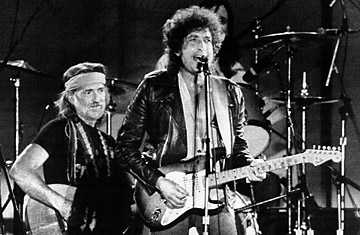
Country Singer Willie Nelson and rock singer Bob Dylan, right, perform on stage before more than 78,000 people attending the Farm Aid benefit concert on September 22, 1985 at the University of Illinois football stadium.
In the 1980s, American farmers were hit hard by what were, at the time, the worst economic conditions since the Great Depression. Droughts ravaged the fields, property values plunged, loan interest rates soared, thousands were forced off their land and faced foreclosure and bankruptcy. The number of suicides among male farmers in the Upper Midwest reached double the national average, according to a study by the National Farm Medicine Center. And in 1985, the Los Angeles Times dubbed farm policy one of the "toughest issues confronting Congress."
The farm problem was widespread, but the issue was thrust into the spotlight on July 13, 1985 when Bob Dylan took the stage at Live Aid, a multi-site benefit concert for African famine victims. "I hope that some of the money that's raised for the people in Africa, maybe they could just take a little bit of it, maybe … one or two million … to pay the mortgages on some of the farms," said Dylan from the stage of Philadelphia's JFK Stadium.
Live Aid organizer Bob Geldof later called the folk-legend's comments "crass, stupid, and nationalistic." But where some saw insensitivity, musicians Willie Nelson (who worked picking cotton as a child), John Mellencamp and Neil Young found inspiration to host their own benefit concert — Farm Aid — which will hold its 25th anniversary concert Oct. 2 in Milwaukee, Wisconsin.
At Farm Aid's inaugural concert, more than 50 artists — including Bob Dylan, Billy Joel, B.B. King and Johnny Cash — performed (at their own expense) for 78,000 rain-drenched ticket-holders at the University of Illinois' stadium in Champaign. "The concert was one of those moments where farmers walked in and had … this feeling of elation and you just almost wanted to cry," said Rhonda Perry, who runs the Missouri Rural Crisis Center and Patchwork Family Farms. "It made us at least know that people are watching."
The 14-hour show and telethon raised more than $9 million for relief aid, a farming hot line service, counseling, and assistance for destitute farmers in need of legal help and job placements. While the proceeds from the first show were significantly less than Nelson's original goal of $50 million, the founders and farmers, who insisted they didn't want a "bail out," said Farm Aid's greatest benefit had nothing to do with monetary profit. "If nothing else, forget the money," Mellencamp said after the concert was first announced. "We are here for awareness."
In addition to raising awareness about farmers' struggles, Farm Aid founders also sought to draw attention to what could be done to solve the problems — mainly, improving farming laws in Washington. "We found out what the real problem was and that reform is the only way out," Young told the Washington Post in 1985. However, after debate and criticism from the American Farm Bureau, Nelson and the founders ultimately decided against using Farm Aid's proceeds to lobby support for the controversial 1985 farm bill. Instead, Nelson and Young personally appealed to Congress three days before the first Farm Aid concert. Young also placed a full-page ad in USA Today on Oct. 4 of that year, asking President Ronald Reagan: "Will the family farm in America die as a result of your administration?"
Farm Aid has maintained its political presence over the years. In 2008, Nelson, Young, Mellencamp and Dave Matthews (who joined the board of directors in 2001) wrote an open letter urging Congress to invest in family farms when considering the recovery package. The following year, Farm Aid staff met with Agriculture Secretary Tom Vilsack to address the drop in milk prices. Farm Aid also tries to promote locally grown food and hawks such produce on concert grounds with "homegrown" concessions.
"It is a hugely different environment today than at the beginning," said Farm Aid Executive Director Carolyn Mugar, noting that the growth of loca-vore and organic diets has been a "big advantage" for Farm Aid. "But we still have a lot of problems."
Perry, who was one of the first Farm Aid grant recipients and the first on-site local food vendor at Farm Aid concerts, said the focus in the 1980s was on fighting government foreclosures. "Now, it's much more of an anti-corporate fight back," Perry said. "We want government … to be a referee and ensure that we have a level playing field."
Twenty-five years later, the annual benefit concert — which Nelson told the New York Times he thought "would only last one year" — has raised more than $37 million, the majority of which has gone straight back to the farmers.
"We realized what the value is of Farm Aid and it's something that shouldn't be abandoned," Mugar said. "It's more important than ever."
